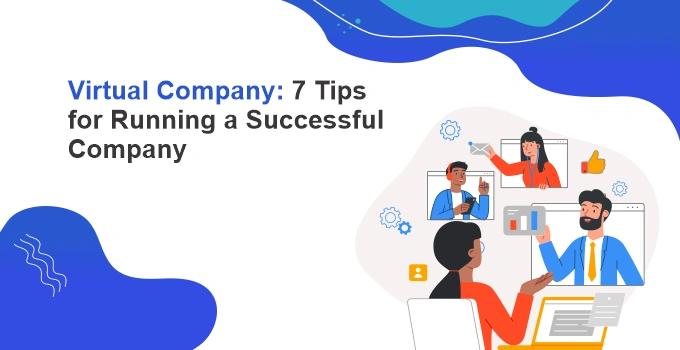Virtual Company:7 Tips for Running a Successful Company
Virtual companies are a great way to maximize your limited resources. By working virtually, you can do more with less, and be more productive with your time. Whether you plan to transition your entire business to virtual or simply want to build a stronger remote team, hiring good talent and building workflows is critical. Working virtually seems like it would be easy, but isn’t. Running a successful virtual company requires the right tools but also a lot of finesse. Here, I’ll share my best tips so you can be successful too!
Virtual Company Culture
Virtual company culture is primarily a set of practices and norms that have emerged within the virtual world and are considered normal in that community. Virtual companies are distinct from other types of businesses in that they both apply technology as a method for creating value and generate revenue from clients and customers outside the virtual space while remaining true to the values and traditions that drive their creators.
Virtual companies can be anything from businesses that run competitions to help raise money or sell products online. Virtual companies have the potential to offer even greater returns than traditional companies even when markets are hard.
7 Tips to Run a Successful Virtual Company
Most people have no idea how important these preliminary steps are and how your success will be directly related to them; they simply don’t know. Here’s some valuable advice on managing a virtual company and achieving business success.
1.Pick the Right Co-founder
A co-founder who complements your strengths and weaknesses will help your startup reach its full potential. While everyone makes mistakes, choosing the right co-founder can ruin your chances of success. Make sure to avoid these common mistakes when considering who to pick as your startup’s first employee or partner. You may even be contributing to the failure of your company if you don’t pick someone perfect for your goals. Here are the top reasons why you should not let your ego get in the way of making sure your business succeeds and grows.
When choosing virtual co-founders, it’s important to consider not only what the future holds but also what has worked in the past. Whether it was a position in a start-up – or even just an entrepreneur who was successful in finishing college – there is always room for growth and improvement. The qualities most sought after by founders are experience, smarts, and passion. Knowing what must be done and how can help motivate even the most hesitant founders to get up and running. The key skills of a virtual co-founder are communication, relationships, strategy, and idea generation.
Click here to read: Don’t Make These 6 Big Mistakes When Starting a Business
2.Get Your Systems in Order
It is important to set up the right practical environment for a start-up. Early commitment is needed to motivate the necessary decision-making that would enable such a start-up to grow rapidly and profitably. An important step toward this end is what is commonly called “getting your systems in order.” Many factors determine the order in which practical operations take place; in particular technical capabilities, financial resources, staff capacities, and entrepreneurial personality.
To successfully launch a virtual business online, you’re going to need to develop a plan for how you are going to build your company from the ground up. List assets and business-related liabilities so you can accurately trace your financial health to the bottom line
3.Build Your Network
Build your network after starting your virtual company. The first step to mastering something is showing up and trying. Virtual companies are so new that most people don’t know how to start them and make the most out of them. When you get started, get involved with a few people who have already made the jump, and help them out where you can. The more connections you build throughout your virtual community, the more traction you’ll build and the more likely it is that someone will hire you full time.
4.Start Small and Grow Organically
Starting a virtual company isn’t cheap. It’s difficult to set up and grow a business, but the investment pays off when you have a dedicated team, so it’s worth working hard.
It might seem counterintuitive, but most people have more success with gradual, slow progress over time than a giant leap to instant success. You can grow your company organically by choosing the right products and marketing channels. News and opinion pieces about your business online, Guest blogging, Product based emails, Directory marketing, are all examples of growing your business organically without spending a dime on marketing.
Click here to read: 21 Ways to Promote a Startup with no Extra Money
5.Know Who Your Target Audience is
The most important piece of advice I can give you before starting a virtual company is this: Know who your target audience is. No one else will provide the resources you need to succeed. If you want to build up your credibility as an expert in your field, you’ll need someone to back you up with real-world expertise.
Once you have started your company, it is important to know who your target audience is and what they need from you. Start by identifying who your primary customers are and working out a distribution plan for all your future product sales. Then work out who your second/third customers will be and work out a distribution plan with them too (this is the phase where you target opportunities).
6.Figure out Profit Margins
Starting a virtual business is often a big step. You need to figure out where you can get some profit margins and what kind of minimum investment you’ll need to start generating cash. Virtual companies can be very simple, or they can be very sophisticated. The fact is, however, that until you have set up a working business – much less a profitable one – you cannot plan out where your money will come from to pay off your initial investment. Profit Margins are an important concept that every entrepreneur needs to understand if they want to start getting some real profits.
7.Track your progress
When you decide to start a virtual company, one of the biggest challenges is tracking progress. To start a virtual business you need a business email address and such, but how do you know if you are making progress towards achieving your goals? There is a wealth of information out there on starting a virtual business, but it can be difficult to separate the wheat from the chaff.
For many founders and investors, tracking expenses independently has advantages over delegating the task of calculating and paying for expenses to a contractor or employee – especially if the contractor or employee is not performing activities that are core to the work being performed.
Click here to read: How to Start a Business from Scratch: 24 Steps to Becoming Operational
Virtual Companies are popping up left and right. Technology has made it much easier to start your own business; you can create and sell a new product or service without having to work for someone else. These start-ups are not only more accessible but are also more innovative in their approach to running the business.
Competition is stiff but so is the choice of services and products offered by virtual companies. You end up doing business with companies whose core values you can trust and whose culture you are comfortable with.



